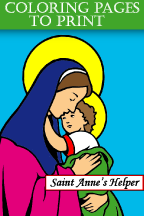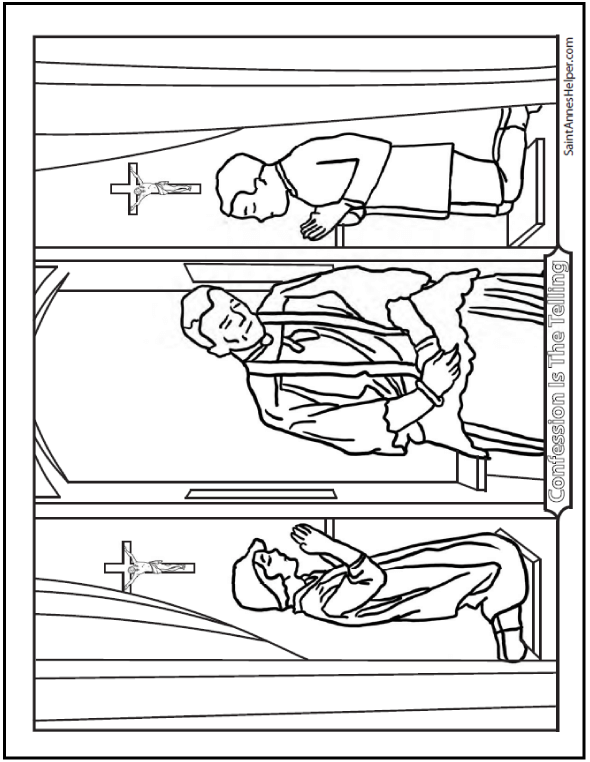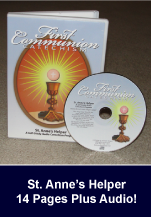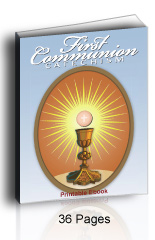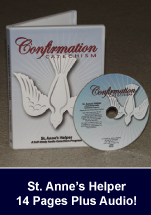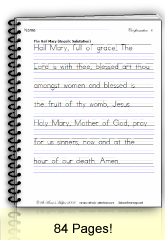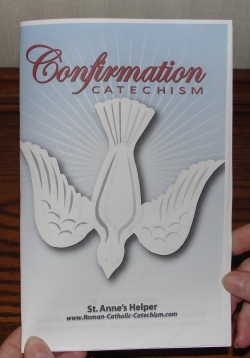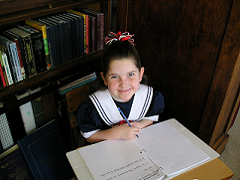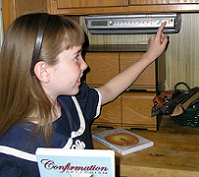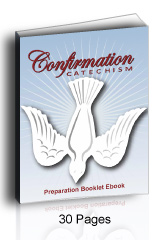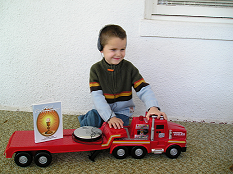- Home
- Seven Catholic Sacraments
- Catholic Penance
Catholic Penance Is
The Sacrament That Effects Reconciliation
Catholic Penance is the way we reconcile our lives back to God's ways. It's God's way of clearing the way for Catholics to come home to Heaven.
The word penance can be understood several ways.
1. Catholic Penance
The Definition Of Penance Is Two-Fold: What Does Penance Mean?
There are two kinds of penance:
- The Sacrament of Penance.
- Personal works of penance.
The two main ways for Catholics to understand the word are as the sacrament of Penance and as the works of penance that we do in reparation or penance for sin.
The priest assigns a penance at the end of confession during the sacrament and we can also perform personal penances of our own choosing. We can also do penance for the sins of others as Our Lady of Fatima asked Lucia, Jacinta, and Francisco in 1917.
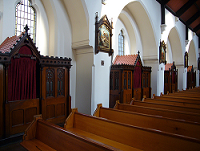 Beautiful Antique Confessionals
Beautiful Antique Confessionals1.A. The Sacrament Of Penance
* Q: What is the sacrament of Penance?
The sacrament of Penance is the sacrament by which sins committed after Baptism are forgiven. (Baltimore Catechism No. 1, Q 187)
For those using the Baltimore Catechism, Saint Anne's Helper offers plenty of review. A complementary Catholic catechism for children that teaches about First Confession is Jesus Comes by Neumann Press.
A child's catechism is also a super condensed version for adults to use as review or as "Cliff Notes" when preparing to receive the sacrament the first time. Truly, a child's catechism is an excellent review.
* Practical Matter For Catechists
How do you know that a child is ready for the sacrament of Penance?
Sometimes this is a tricky situation. You want the child to receive as soon as he is of the age of reason and you do not want to wait too long without confession which can prevent a child from forming habits of sin. You certainly want your children to receive the sacrament of Penance before their First Communion.
First, anyone preparing for confession needs to be familiar with the Ten Commandments. They tell us what is a sin and what is not a sin. All right and wrong depends on God's Ten Commandments. We do not need to be experts, yet we must have a general understanding.
Next, we need to know what is a mortal sin and what a venial sin is. HINT: It's easy once you know what a mortal sin. If it is NOT a mortal sin, it is venial.
Yet being able to discern a mortal sin from a venial sin is necessary for preparing to receive the sacrament. If a child cannot discern the difference, that child is not ready for the sacrament of Penance or the Holy Eucharist except in danger of death. See the sweet story below.
Here's a quick way to know whether someone is ready to go to confession that I learned from the beautiful Sisters who taught our children: Give a quick quiz of ten situations like these.
- Suzie took a pencil from Tom's desk.
- Mr. Moneybags took $1000 from a little old lady.
After saying each statement, ask the children whether it is a mortal sin or venial sin for each of the situations. They can write M or V or they can simply tell you the answer by speaking or pointing to the answer.
Do not give tricky situations. Do not use names of people the children might know. Do not continue with what might suggest sins to the children or scandalize them. Leave tricky situations and matters of the Sixth and the Ninth Commandments to high school and seminary training.
* The Sweet Story Of A Child Who Died Without Confession
The confession quiz is not a test that should be graded. It's not that sort of assessment. It is only to find whether a child has the use of reason or is at the age of reason. Can he or she tell the difference between a mortal sin or a venial sin?
There once was a darling little girl who was not ready for Confession and was to wait till later - closer to Communion time. She was a good girl and was happy to make little acts of love to Jesus and Mary. Soon after, she was killed in a car accident. Her death grieved her parents immensely and the whole community with them.
Precisely because the Sisters knew that she was not ready, that she had not been at the age of reason, the priest was able to offer the Mass of the Angels for her funeral. He explained all of this in the sermon.
He added that compared to a freshly baptized child, she went to Heaven with more graces because she had actively loved Jesus and Mary. Her prayers at Mass, with her family, and at school all added to her love of God and her glory in Heaven.
What a powerful thought for those of us who are catechists! What a grave responsibility we parents and teachers have to offer children the opportunity to know, love, and serve God, especially at Mass, Rosary, and other prayer times.
Use the Baltimore Catechism?
Disclosure: I show products that I think will help you. If you use my links, I may earn ad commissions at no extra cost to you. As an Amazon Associate I earn from qualifying purchases.
1.B. What Is A Penance?
As the work given by the priest to repair for the sin forgiven in the sacrament of Penance, "a" penance is the prayer or works.
The penitent does this penance after confession.
Some penances are:
- Pray three Hail Marys.
- Pray five Our Fathers.
- Pray a particular litany usually related to the season.
- Pray other prayers related to the confession.
- Return what you have taken. (7th Commandment)
- Fix what you have broken. (7th)
- Correct stories you have falsely witnessed. (8th)
1.C. Personal Penance Or Penances
As a personal penance it is chosen by the penitent. Here penance is understood as a voluntary work that the penitent uses either
- to repair for sins committed,
- add power to a prayer for oneself and others,
- or to simply add to his store of supernatural grace.
1.D. How To Go To Confession
Catholic Confession is the telling of my sins to a priest to have them forgiven, NOT a group effort to "examine our conscience" as in some catechisms. Why do we say that we're going to confession? Simply, Penance is the sacrament, confession is the telling, and the penance is the work performed.
- Penance is the sacrament.
- Confession is the telling.
- Sacrament of reconciliation?
- Confession coloring page.
What Is Sin? Sin is disobedience to God's law.
It's super simple and why learning the Catholic Ten Commandments is so important in preparing for confession.
Most catechisms based on the Catechism of the Council of Trent and the Baltimore Catechism, like The Catechism Explained and Jesus Comes, teach what God's Law tells (commands) and forbids in the Ten Commandments.
2. How To Receive The Sacrament Of Penance Worthily
These teach that to receive the Sacrament of Penance worthily I must:
1. Examine my conscience.
2. Be sorry for my sins.
3. Make up my mind not to sin again.
4. Confess my sins to the priest.
5. Do the penance the priest gives me."
After that you simply do the penance the priest gives you and thank God for forgiving your sins.
Thank God indeed! Especially in these days.
The greater sorrow one has for his past sins the greater his joy after absolution because he receives greater graces! (Catechism of Pope St. Pius X)
A good Catholic booklet on the sacrament of Confession that teaches this truth well is Confession - Its Fruitful Practice (With an Examination of Conscience) by Tan Books. The Examination of Conscience is excellent! I share more in Section 3.
We heard one good priest quote St. Alphonsus Liguori as saying that the reason that a Catholic penance that a priest gives is usually not longer than a Rosary is that God wants us to hate the sin not the penance. What a consoling thought. What a duty for confessors.
We usually go to a confessional in a church to make our confession and there are usually set times so one does not have to make an appointment, which can be embarrassing and sometimes a deterrent from going to confession.
On the other hand, if there is an emergency or if one is coming back to the Church, it's good to set an appointment for a longer meeting and the opportunity to seek advice.
Churches and chapels usually have very traditional confessionals somewhere in the nave, usually in the back. It doesn't take courses and studying to come back to the Church, simply go to confession. Father will tell you what to do after that.
There are occasions when we do not use a confessional as when there are confessions available on long pilgrimages. The priest simply walks separately and penitents drop back to him as they will. This is super handy when we can earn indulgences when we are on pilgrimage. We can usually get both confession and Communion under the usual conditions.
Saint Anne's Helper CDs and worksheets cover Catholic Penance in the First Communion downloads. The Confirmation catechisms add the words to the definition "through the absolution of the priest". If you're teaching children about the sacrament of Penance, you can order Baltimore Catechism worksheets and ebooklets here.
2.A. Sacrament Of Confession: What Do You Say In Confession?
Go into the confessional, kneel, and say:
"Bless me Father For I have sinned. It has been two weeks since my last confession and these are my sins." (Change the time accordingly.)
In the confessional Confess your sins to the priest telling the mortal sins first and venial sins last. If there are no mortal or venial sins, you can confess an old sin that you still fight. The more contrition you have, meaning the more sorrow you feel, the more graces God sends. After confessing say:
"I am sorry for these sins and all the sins of my past life."
Father will give a short word of advice and tell you your penance, and will then ask you to say the Act of Contrition prayer. You receive more graces if you say the perfect Act of Contrition as it expresses your love for God. Find the perfect Act of Contrition as taught in the Baltimore Catechism here.
Father then blesses you and may ask you to pray for him. You may answer if you like or simply leave the confessional. Learn more about sacramental confession here.
2.B. When To Perform The Personal Penance
Now you pray the penance father has given.
When do you do your penance?
Right away. It is best done immediately (so one does not forget the penance or forget to do it) in the church (all prayers are enhanced before the Blessed Sacrament).
Where do you go to do your penance and make a thanksgiving?
If the chapel is very small it can be good to go to the communion rail or front pew so as not to be distracted by the movement of the confession line or to distract or overhear the penitents there.
If there are other lines of penitents then simply chose a pew away from the lines and kneel there. Remember to say the penance the priest gave first and then, after that is well said, thank God for forgiving your sins.
What about a personal penance?
A personal penance does not have to be a giant and gruesome work nor is it attached to the sacrament of Penance. The Church teaches that praying, fasting, and giving alms are very good sacrifices that we can use as penances.
The best penance according to Our Lady of Fatima is simply to do one's duty of state. We can add being cheerful or being careful to increase the merit of our works.
Do consult with a priest before committing to any unusual or burdensome penance.
2.C. Unusual Circumstances
The Penitent
What should one do when either the penitent or the priest is so loud that he can be heard in the church?
Usually this only happens with very small children so humming quietly or whispering the Hail Mary can cover the moment. Yet sometimes the cause is a poor door or curtain. In that case some parishes put a noisy box fan near the outside of the door or curtain.
The Confessor
Only very seldom is it the priest who is loud enough to be heard, and often he is a new priest or a very old priest. In this case plug your ears and/or quietly hum or whisper prayers; then politely caution him that you could hear him outside when it is your turn.
Another idea is to begin the Rosary, or a decade of the Rosary, out loud. Other penitents will be very happy to answer in this situation. We have been edified to see these very things.
As a matter of fact the parish that we attend frequently has over eighty First Penitents. Sister usually has another Sister, one of the attendant parents, or other parishioners lead the Rosary while she attends to the children in line. A child can be too loud his first time or two since he has memorized to be sure to say the Act of Contrition loud enough for the priest to hear him! :-)
3. Catholic Penance: Confession Is The Telling
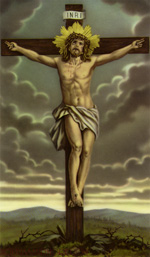 Forgive them...
Forgive them...3.A. The Purpose Of Confessing
The purpose of going to confession is to have your sins forgiven. The priest absolves you of your sins.
By confessing one's sins one can avoid going to Hell, and hopefully with the right dispositions, one can also avoid going to Purgatory.
The penitent must be contrite, meaning sorry, and must complete the penance the priest gives. The more sorrow a person can realize for his sins, the more graces he receives for confessing - especially the grace of avoiding the same sins and growing in virtue.
3.B. Penance Versus Reconciliation
When you are looking for the term Catholic Penance in a newer book, look for Catholic Reconciliation; yet be certain that the book teaches what the Church has always taught.
Since this can be difficult to discern for the whole book, choose good editions of older catechisms - one clue is that Penance is the sacrament and is the term used. Reconciliation is the fruit of contrition and penance. You want what the Church has always taught.
3.C. Singular Versus Plural
* Choose To Teach The Singular Catechism Answers
Of course, there is a sense in which we say that "we" as Catholics confess "our" sins; yet when you're preparing little children, it is important to teach them the singular answers to the Penance and confession answers.
I have seen catechisms differ on the number of people involved. Some ask the child to memorize that "We examine our conscience." Others more appropriately note teach, "I must examine my conscience." using the singular first person.
Please realize that "we" don't have "a" conscience.
Another scary thought for children is that others might know each other's own sins, especially young children. This false idea is inferred to adults as well.
* Priests Warn Catechists To Teach Children Not To Confess The Sins Of Others
We are grateful the good priests in the many churches and chapels that we have been in who have kept the traditional sacrament of Penance use the singular terms for going to confession.
When the catechist uses booklets or questions and answers that teach children to respond in the plural, the pastor often must say, "Parents, please teach your child to confess his own sins, not to confess the sins of others."
There's been a time or two I've wanted to raise my hand and suggest he change the book that is being used in catechism class. :-)
Another thing about plural answers is that there is a huge false movement of clergy apologizing for sins of other people in the past as if today's people can effect pardon for past offenses. No we must confess our own sins and we are each responsible for our own sins individually. In a way, we are responsible for the sins of others if we have scandalized others and caused them to commit sins; yet only those people can obtain forgiveness by individually going to confession themselves. There is no such thing as a corporate conscience.
* Drum Up Some Sincere Contrition!
Did you know that all of the graces that you have received from the other sacraments (Baptism, Confirmation, Holy Orders, and Matrimony, etc.); yet lost by sin, can all be restored by a good Confession? This sacrament is so important!
Think of having all of these graces restored! The booklet called Confession - Its Fruitful Practice (With an Examination of Conscience) by Tan Books explains this according to St. Thomas Aquinas on page 18. He explains that the restoration of graces is proportional to the penitent's sorrow. Isn't that amazing? This is why we need to prepare for confession, to take quiet time to pray for the grace to have perfect contrition.
Our sorrow is best aided when we ask the Holy Ghost to come to us and when we think of Our Lord's Passion and Death. Sorrow is simply wishing that we hadn't done a thing. Once we realize that, it is easier to be truly sorry.
Remember, "proportional" to my sorrow. The more sorrow I can raise the more graces I, will receive! This is so important because when sin darkens the soul, the intellect and the will lose their strength, then the cycle just gets worse. This is why so many people cannot see truth (the use of the Intellect) or choose (the use of the will) the better thing.
* The Secret Of The Confessional
It is a comfort to know that one's privacy is protected by the door or heavy curtain. The grate between the priest and the penitent offers further privacy and is a great aid to the "secret of the confessional". Sometimes there is no curtain; yet older churches had enough space that being in confession was private simply due to the space.
On the other hand, new Catholic churches have what's called reconciliation rooms where they confess face to face with the priest. It is not wrong to do so; yet it can be super hard to conquer the feeling that the priest knows you and may share his information. It's just a feeling, yet no wonder people do not want to receive the sacrament of Penance when they have to sit in front of a priest with no screen. Some "Reconciliation rooms" even have a window to the nave, the main part of the church! This is a further deterrent!
Even the darkness of a normal confessional serves privacy well. Usually the priest's booth is well lit so that he can read, if he can. The light also makes it hard for him to see into the dark booth. Even the booths that are lit are dimly lit to both aid privacy as well as the penitent who needs to read a note or a prayer. Usually, the only light is a courtesy light that is there in case the penitent needs it.
Many of the confessionals we have seen were antiques that were rescued from churches that were defaced or destroyed. They frequently have the most beautiful ornate woodwork. One can see the labor of love in their decorations. They frequently are decorated with the symbols of the Catholic Church or some great penitent saints like St. Mary Magdalen which tells a story in itself and encourages us to imitate the virtues.
Over the grate, or next to it, there is usually a Crucifix to remind the penitent of the sorrow that he should have for Our Lord's passion. As noted above, this very sorrow is the measure of the grace the penitent will receive from this sacrament and the measure of Purgatory time removed, so treasure that Crucifix and ask Jesus to make you truly sorry.
4. Catholic Penance: Sacrament Of Reconciliation
Catholic Reconciliation with capital letters is the Catholic sacrament of Penance. If it's not, you'd better find out why.
It is true that we reconcile our lives with God by confessing our sins and obtaining His forgiveness as Jesus said on Easter Sunday night. Catholics have the consolation of knowing that this sacrament is effective when it is received in the proper disposition of sorrow for sin and purpose of amendment. Your sins are truly forgiven. Your soul is reconciled to God. It is that simple.
Saint Anne's Helper Audio Catechism teaches the text of a good Confession and the doctrine necessary to know how to make a good confession with the First Communion audio or worksheet download which makes the memorization and review much easier. "Bless me Father for I have sinned..."
 St. John The Baptist
St. John The Baptist5. Teaching The Duty To Go To Confession Once A Year
5.A. Advent
If you are using a school year to teach about confession and First Communion, Advent is a good time to start teaching about sin, penance, and confession. Since the Roman Catholic Advent Season is a time of preparation for Our Lord's coming at Christmas, it's a good time to teach what children will need to know. Penance is necessary to restore grace after we commit sin.
According to the Douay-Rheims Bible St. John the Baptist "came into all the country... preaching the baptism of penance for the remission of sins.... A voice of one crying in the wilderness: Prepare ye the way of the Lord" (Fourth Sunday of Advent - Luke 3:3-4). Jesus Himself says in Luke 13:5 "No, I say to you; but except you do penance, you shall all likewise perish." True Catholic reconciliation requires penance as well as repentance.
What better Advent preparation, than to follow Jesus' own advice to do penance while preparing for Christmas? Also, it is said that the more holy the Advent you have, the better your Lent will be. The more holy your Lent, the more you will rejoice on Easter Sunday!
5.B. Lent
Lent is an important time to go to confession, especially to meet the Easter duty to confess and receive communion between Septuagesima Sunday and Trinity Sunday, so try to schedule your students' first confession during this time if possible and teach them the habit of going to confession during the Easter Time.
The Catholic Church requires that one receive Catholic Penance at least once a year. Since she also requires that one receive Holy Communion during the Easter Time, most Catholics also go to confession so as to be better prepared to receive Jesus in the Blessed Sacrament.
We imitate Jesus Himself as He prepared for 40 days for His Passion and Death. If Our Lord Jesus Christ prayed and did penance for so long for our sakes, just think what penance we must need to do. Jesus Is the Example to follow when trying to follow a Catholic Lent!
The forty days of Lent is the penitential season of preparation for the death and resurrection of Jesus Christ on Easter Sunday. The season of Lent begins on Ash Wednesday. Here are some Lent activities for children.
6. Saint Anne's Helper Helps You Teach The Sacrament Of Penance
Saint Anne's Helper catechism teaches the basic Catholic beliefs as taught by the Baltimore Catechism.
The Catechism Explained, The Catechism of the Council of Trent, and The Church Teaches offer excellent adult explanations. You can learn or teach about Catholic Penance and also these other sacraments using our First Communion downloads:
Catholic Baptism
Catholic Baptism is the sacrament which cleanses us from Original Sin, makes us Christians, children of God, and heirs of Heaven. (Baltimore Catechism No. 1, Q 152)
Few of us are able to resist the temptation to mortal sin and venial sin. What would we do without the sacrament of Penance if, as Jesus said, that nothing imperfect will enter Heaven? Thank God for this chance to repair!
Catholic Eucharist
The Holy Eucharist is the sacrament which contains the Body and Blood, soul and divinity, of our Lord Jesus Christ under the appearances of bread and wine. (Baltimore Catechism No. 1, Q 238) Saint Anne's First Communion Audio Catechism (CD or Download) and Catechism Copybook teach the Roman Catholic beliefs about creation, Heaven, Original Sin, Hell, the Catholic Ten Commandments, Catholic Baptism, Catholic Penance, Holy Eucharist and the Mass. The best companion to this is the book Jesus Comes as published by Neumann Press.
Catholic Confirmation
Confirmation is the Sacrament through which we receive the Holy Ghost to make us strong and perfect Christians and soldiers of Jesus Christ. (Baltimore Catechism No. 1, Q 166) Saint Anne's Catholic Confirmation Audio Catechism and Catechism Copybook teach the Catholic beliefs about the Blessed Trinity with an emphasis on the doctrine of the Holy Ghost; Jesus' Incarnation, Resurrection, and Ascension; the seven sacraments; the precepts of the Catholic Church and the Catholic Holy Days of Obligation and much more. The Confirmation questions come from the Baltimore Catechism.
7. Catholic Penance Coloring Page
See these related pages:
Audio Baltimore Catechism, Catholic Worksheets, Catholic eBooks, and Catholic Coloring Pages:
Catholic catechism resources for your Roman Catholic catechism class, Faith formation, Catholic homeschool, religious education, or Sunday school lessons. Save on bundles!
Order our Baltimore Catechism worksheets. Choose your favorite fonts, colors, and SIZES on our fillable digital interactive worksheets and coloring pages. Paperless or printable.
First Communion Preparation Baltimore Catechism No. 1 For Children And Adults - Or get the bundle.
Baltimore Catechism Communion single or bundled downloads: audio, ebooklet, and digital worksheets for kids and adults. Verbatim text in all formats.

